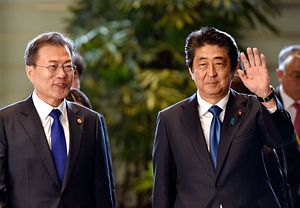One of the world’s most important trade relationships may have hit the rocks. According to the Wall Street Journal, Japan has imposed export controls on the transfer of certain technologies to South Korea. Japan is ending preferential treatment, which essentially grants blanket permission for exports, and is requiring exporters to get specific approval for the transfer of certain goods. Targeted technologies include fluorinated polyimide, used in smartphone displays, and photoresist as well as high-purity hydrogen fluoride, used in semi-conductor production. Firms will now need to apply for permission to transfer these technologies, a process that could take some 90 days.
Mayumi Negishi and Eun-Young Jeong report that the export controls could affect Samsung Electronics, SK Hynix Inc., and LG Display Co. Analysts warn, however, that the restrictions could rebound on Japanese firms that depend on South Korean semi-conductors. Much as the U.S. ban on Huawei could disrupt global supply chains, this decision could make it difficult for both Japanese and South Korean technology firms to continue integrating production, with negative effects on international competitiveness.
Most commentary is framing this decision in context of the diplomatic strains between Seoul and Tokyo over World War II history, which have grown worse over the last couple of years. Japan has grown frustrated with what it perceives as Seoul’s unwillingness “to take yes for an answer” with respect to historical memory of the war. South Korean rapprochement with North Korea has further complicated this issue.
However, Japan may also have other motives. Just as the United States has lashed out at China over intellectual property protection concerns, South Korean IP behavior has long been viewed with suspicion by trading partners. South Korea was once viewed as a major IP offender, although it cleaned up much of its act in the 1990s and 2000s. Allegations of IP violations have persisted into the last decade, however, and may have affected Japanese thinking on how to protect its technology sector.
In either eventuality, Japan seems to be taking a cue from the Trump administration, “weaponizing interdependence” to generate leverage in diplomatic and economic disputes. Even if it pays off in the short term, over the long term such behavior poses obvious dangers to the global economy. Along with the looming U.S. trade war with China, further conflict between South Korea and Japan (South Korea could respond with export controls of its own) could introduce an extraordinary degree of uncertainty into global supply chains, and the international technology economy more broadly.

































